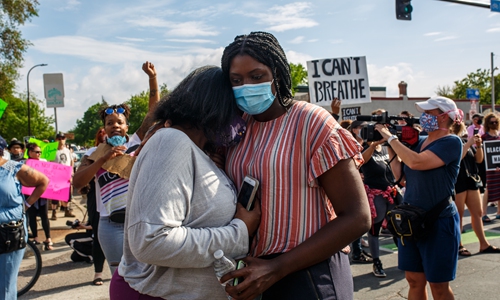US may face steep slump
By GT staff reporters Source:Global Times Published: 2020/6/1 18:48:40
Coronavirus, riots harm economic recovery

People hold signs and protest during a rally after a Minneapolis Police Department officer allegedly killed George Floyd on Tuesday in Minneapolis, Minnesota. A video of a handcuffed black man dying while a Minneapolis officer knelt on his neck for more than five minutes sparked fresh furor in the US over police treatment of African Americans. Photo: AFP
The Trump administration, facing a spreading coronavirus public health crisis and a raging national protest and rioting caused by the brutal death of a black man under a white police officer's knee, is leading the US economy on the path to a deeper recession.Experts warned that the US, as the largest economy in the world, could be a stumbling block at a critical time, when the world is striving to recover from the COVID-19 pandemic.
COVID-19 cases in the US are still rising - there were at least 1,790,172 confirmed US cases as of early Monday and at least 104,381 deaths, according to a Johns Hopkins University tally.
And, the protests and riots that have erupted in cities across the US in response to the death of George Floyd could spread the virus more quickly. Minnesota's COVID-19 death toll continued its climb on Friday, rising to 996, reported local media.
All these whammies together are leading the US economy on a path to a protracted recession from which it may not recover until 2023, experts predict.
The US economy's first-quarter contraction was steeper than estimated. Its GDP fell 5 percent in the first quarter, which marked the steepest quarterly decline since the last 2008 recession, according to a Wall Street Journal report.
"It's not the 'bottom' for the US economy yet. The second-quarter data would be even worse, and there's no doubt that the US economy is struggling in a recession," He Weiwen, a former senior Chinese trade official and an executive council member of the China Society for World Trade Organization Studies, told the Global Times on Monday.
"It's not clear how the protests and rioting - which are a result of intensified social conflicts and economic discrepancies - will affect the US economy, but if the protests continue, the US economy will stay at the bottom for a longer time," He said.
More cities in the US including Washington DC, Atlanta, Seattle, Los Angeles and Chicago have imposed curfews as they braced for more unrest on Saturday and Sunday nights US time, and many stores, which had reopened after a broad lockdown domestically, were forced to shut down again over the riots.
Protests and riots will lead to rising bottlenecks and disruptions in supply chains, and "whether you look at it from the perspective of unemployment or the US debt problem", the country is now facing a "very severe" problem, He said.
According to the US Department of Labor, more than 40 million Americans have filed for unemployment at the end of May, bring the unemployment rate to around 20 percent - which will translate to further slump in domestic consumption.
As the US accounts for almost 22 percent of global output, it's inevitable that a depression in the US will drag on the global economic recovery, experts say.
"A longer recession in the US economy will have a huge impact on the global economy, but what the world should be more worried about is growing protectionism and techno-nationalism in the US, which could contribute to its economic rain days," He said. "Not only China ... its major trade partners such as the EU and Japan will all suffer," He added.
Nevertheless, Gao Lingyun, an expert at the Chinese Academy of Social Sciences in Beijing, told the Global Times on Monday that it was the developing countries that were leading global economic growth in recent years, instead of the US.
"With China's economy getting back on track, and as long as no major mistakes occur in the economic policies of major developing economies while the coronavirus recedes, we have confidence that the world economy could rebound soon," Gao said.
The Caixin/Markit manufacturing Purchasing Managers Index, a gauge of activity in China's manufacturing sector, returned to expansion territory at 50.7 in May, reflecting an accelerated recovery in China's economic activity. The index was up 1.3 points from April and the highest since February.